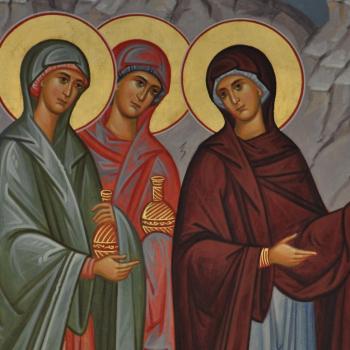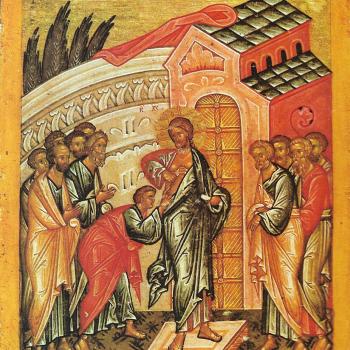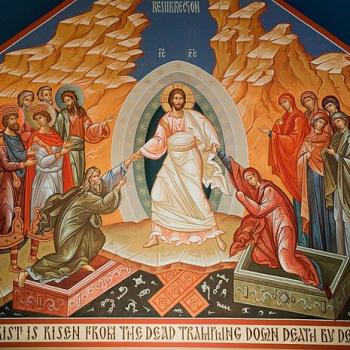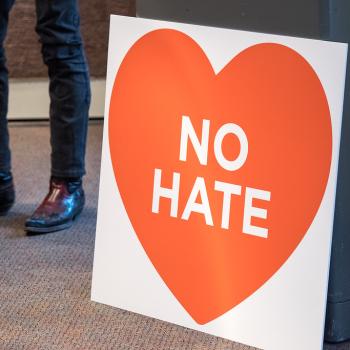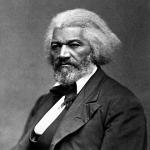
St. John Chrysostom, in his famous Paschal Homily, shows us the true spirit of Easter in the way he says everyone is called to come and celebrate the joy of the resurrection. His message is one of inclusion and love, not of hate and exclusion, so that even those who might have thought they should be excluded from the Paschal feast are told they are welcomed and wanted at it:
Come you all: enter into the joy of your Lord. You the first and you the last, receive alike your reward; you rich and you poor, dance together; you sober and you weaklings, celebrate the day; you who have kept the fast and you who have not, rejoice today. The table is richly loaded: enjoy its royal banquet. The calf is a fatted one: let no one go away hungry. All of you enjoy the banquet of faith; all of you receive the riches of his goodness. Let no one grieve over his poverty, for the universal kingdom has been revealed; let no one weep over his sins, for pardon has shone from the grave; let no one fear death, for the death of our Savior has set us free: He has destroyed it by enduring it, He has despoiled Hades by going down into its kingdom, He has angered it by allowing it to taste of his flesh.
This is the spirit every Christian should have when celebrating Christ’s resurrection from the dead. They should see the way God grants forgiveness to the world. They should desire for everyone to come and receive the love and grace which Christ offers. No matter what anyone has done, God’s love is there for them, even as the grace God offers is capable of perfecting them. God’s grace is sufficient. By death, Jesus has conquered death, and to those in the graves, those pained and hindered by sin, he has granted life.
Christ’s resurrection sets us free. During Eastertide, and beyond, we come together and celebrate our newfound freedom in Christ. We are to share with each other, indeed, with everyone, the love God has given us. If we want to honor Christ and what he has done, if we want to honor his passion and resurrection, we must join in with a spirit of love, not hate. Everyone, from those who are spiritually poor, those who indeed, are sinners, to those who are spiritually rich and who have few sins of their own, are called by Jesus to join in with him in his resurrection from the dead, sharing with him the glory of the kingdom of God.
Why, then, are so many Christians undermining the spirit of the resurrection? Why do they want to use it as a political tool to ferment more and more hate in the world? Jesus told us to come together, to love each other, to welcome those who have been treated as outcasts, those who have been undermined and abused by society. Sadly, so many do not listen to Jesus and instead want to promote hate, saying some people have no right to celebrate the Paschal Feast. This seems to be what is going on with those who have turned their attention to transgenders and the way President Biden continued the annual tradition of remembering the Transgender Day of Visibility, which takes place on March 31 every year, and used his proclamation to attack Biden and transgenders. They accused Biden of undermining Easter, though Biden clearly remembered Easter and celebrated it, unlike many of those attacking him. The Transgender Day of Visibility is a day which draws attention to the abuse transgenders face, the abuse which has led too many of them unjustly losing their lives (or livelihoods). Biden’s proclamation, in this instance, can be seen as reinforcing the spirit of Easter by reinforcing the way of Christ, the way of love, welcoming and helping those who have been unjustly treated and abused by society (as, for example, Jesus did with Samaritans in his ministry). Biden’s proclamation did not replace Easter, but it can be seen in the light of Easter, especially in light of Chrysostom’s homily, as an example of the spirit of Easter. It highlights how everyone should be included in the Paschal celebration. Thus, we also read in Chrysostom’s homily:
Let all pious men and all lovers of God rejoice in the splendor of this feast; let the wise servants blissfully enter into the joy of their Lord; let those who have borne the burden of Lent now receive their pay, and those who have toiled since the first hour, let them now receive their due reward; let any who came after the third hour be grateful to join in the feast, and those who may have come after the sixth, let them not be afraid of being too late; for the Lord is gracious and He receives the last even as the first. He gives rest to him who comes on the eleventh hour as well as to him who has toiled since the first: yes, He has pity on the last and He serves the first; He rewards the one and praises the effort.
Instead of celebrating Easter, instead of looking to the way the kingdom of God is revealed as the kingdom of love in light of the resurrection, so many so-called Christians became interested in denouncing and undermining Biden, but also, denouncing and undermining the dignity of transgenders. Transgenders, just like such Christians, are loved by Christ, as everyone is loved by Christ. But transgenders often are not told this, indeed, they are made to think they are hated. What better way to show them the love than to promote their inherent dignity and reminding everyone that they should not be hated or abused? The hate spewed in the name of Christ, and with it the politicization of such hate, shows how far many Christians are from Christ and Christ’s way. They seem to follow after the zealots, and perhaps Judas, seeking to use Christ as an earthly power to control and dominate others, while not really taking to the message of Christ and living it themselves. Who is it that truly stands in contrast to the message of Christ, the message of Easter? It is not the one who takes it seriously and tries to offer love to those who society, and especially Christians, treat as unlovable. It is not the one who takes the spirit of love seriously, showing transgenders care – indeed, it does not have to be done only at Easter, as it should be done at all times, as exemplified by Pope Francis who has offered his care and love for transgenders in Italy. Hate, especially when it is used for political power and gain, is the exact opposite of the way of the kingdom of God:
In spite of all these things, God remains well disposed toward everyone. To no one does he deny his mercy. Why, he even bestows many good things indiscriminately upon all. He prefers to invite with acts of kindness those whom he could rightly subdue with punishments. Delay in retribution makes room for repentance. It cannot be said, however, that there is no vengeance where conversion does not take place. For, a hard and ungrateful mind becomes already its own punishment. It suffers in its conscience whatever has been deferred by the goodness of God. [1]
All are called, all are loved by Christ:
Therefore the grace of Christ is at hand every day. It calls out and says to everyone without exception, ‘Come to me, all you who labor and are burdened, and I will give you rest,’ because he desires ‘all to be saved and to come to the knowledge of the truth.’ But if he does not call all universally but a few, it follows that not all are burdened by original sin and by present sin and that these words are not true: ‘All have sinned and fall short of the glory of God.’ Nor would it be believed that ‘death has passed through all men.’ And so true is it that all who perish do so contrary to God’s will that God is said not to have made death itself, as Scripture testifies: ‘God did not make death, nor does he rejoice in the loss of the living.’ [2]
Easter, Pascha, should be the ultimate representation of this. St. John Chrysostom’s homily, because it exemplifies the love Christ has for all, and the way all are called to share in the joy of the resurrection, has become a classical representation of the spirit we should foster with Easter. We should not desire to use Easter for political gain, or worse, for the sake of stirring up hatred, especially hatred against a group of people who already suffer grave abuse. Lifting them up, reminding us to care for them as we are to care for everyone, is truly a Christian thing to do:
Act so that your behavior can be an example for everyone. If you consider what would happen if everyone did like you, then you would realize that society would start to fall apart and that life in general would become unbearable for everyone, including you. So try to behave so that your behavior, if repeated by everyone, would make life, if not perfect, at least bearable. [3]
Let us ask if what we do makes life at least bearable to those who suffer grievously, those who have been treated badly, those who often are led to hate themselves and seek to kill themselves because of such hate. Do we share with them the love of God, the joy of the resurrection, and the hope of the kingdom of God, or do we exemplify hate, trying to destroy that which God would lift up and love? The Spirit of Easter should be the Spirit of love and joy, indeed, of inclusion, recognizing that sin and destruction does not have the final say.
[1] St Leo the Great, Sermons. Trans. Jane Patricia Freeland CSJB and Agnes Josephine Conway SSJ (Washington, DC: CUA Press, 1996), 153-4 [Sermon 35].
[2] John Cassian, The Conferences. Trans. Boniface Ramsey, OP (New York: Newman Press, 1997), 472-3 [Thirteenth Conference; Chaeremon].
[3] Pavel Florensky, Letters from the Gulag. Trans. Adela Lawless (No City: Independently Published, 2020), 304 [To Mik, Jan. 3-4, 1937].
Stay in touch! Like A Little Bit of Nothing on Facebook.
If you liked what you read, please consider sharing it with your friends and family!
N.B.: While I read comments to moderate them, I rarely respond to them. If I don’t respond to your comment directly, don’t assume I am unthankful for it. I appreciate it. But I want readers to feel free to ask questions, and hopefully, dialogue with each other. I have shared what I wanted to say, though some responses will get a brief reply by me, or, if I find it interesting and something I can engage fully, as the foundation for another post. I have had many posts inspired or improved upon thanks to my readers.








